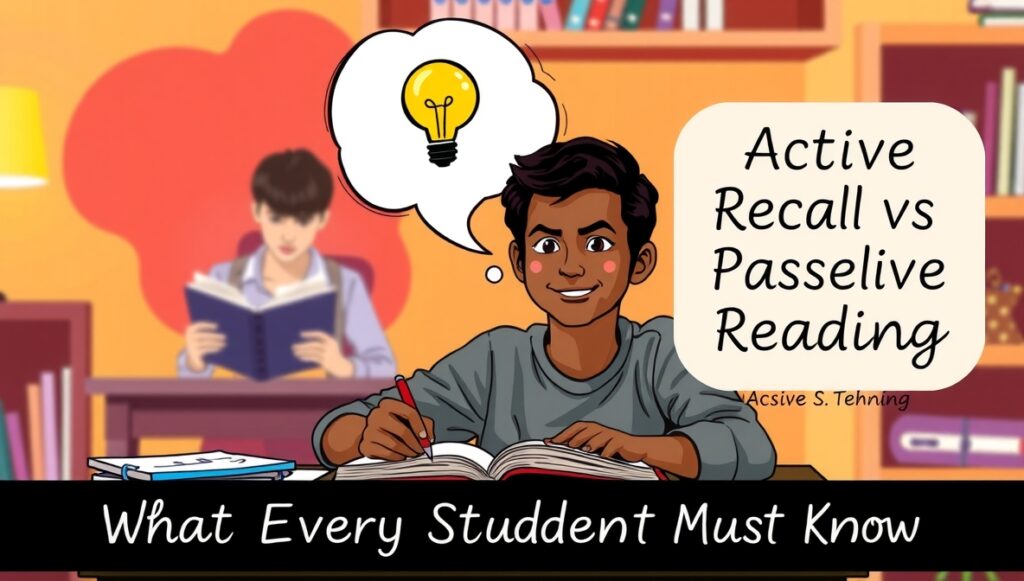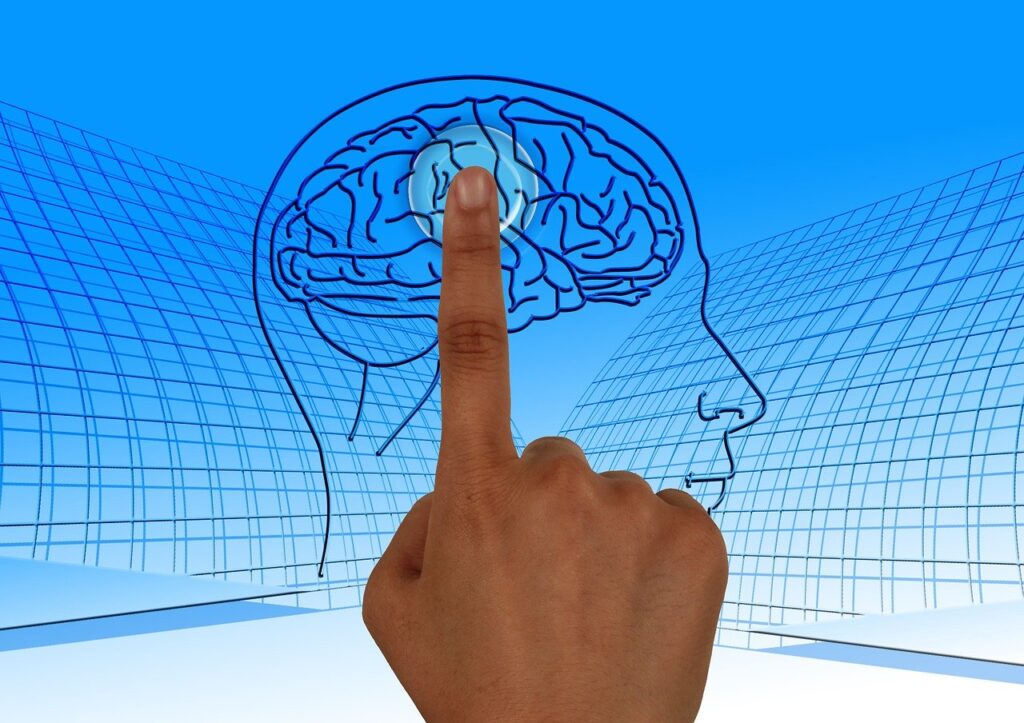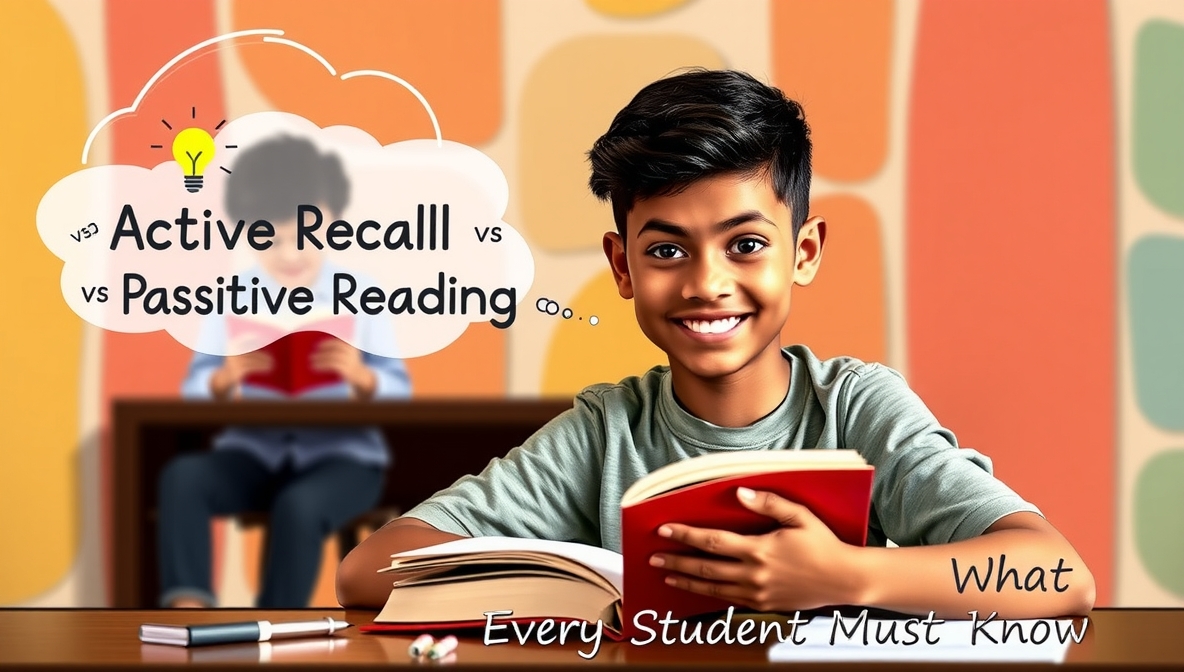Picture this: Two students spend identical amounts of time studying the same material. One student, Alex, repeatedly reads through textbook chapters, highlights important passages, and reviews notes multiple times. The other student, Jordan, closes the book after one reading and tries to recall everything from memory, tests themselves with flashcards, and explains concepts aloud without looking at materials. When exam day arrives, Jordan significantly outperforms Alex, despite spending the same amount of time studying.

This scenario plays out in classrooms worldwide, illustrating one of the most important discoveries in learning science: the method of study matters far more than the time spent studying. The difference between active recall and passive reading isn’t just academic theory—it’s the distinction between efficient learning and time-wasting illusion of knowledge that can make or break your academic success.
This comprehensive guide will expose the hidden inefficiencies of passive reading, reveal the transformative power of active recall, and provide you with scientifically-backed strategies to revolutionize your learning approach. Understanding these concepts isn’t just about getting better grades—it’s about developing learning skills that will serve you throughout your academic career and professional life.
The Science of Learning: How Memory Actually Works
Understanding the Forgetting Curve
In 1885, German psychologist Hermann Ebbinghaus discovered the forgetting curve through meticulous self-experimentation. His research revealed that humans forget approximately:
- 50% of new information within one hour
- 70% within 24 hours
- 90% within one week
This isn’t a flaw in human memory—it’s an evolutionary feature. Our brains are designed to discard information that doesn’t seem important to survival or success. The key insight for students is that your brain determines importance based on how often and how effortfully you retrieve information, not how often you passively encounter it.
The Testing Effect: Why Retrieval Strengthens Memory
Decades of cognitive psychology research have confirmed what’s known as the “testing effect” or “retrieval practice effect.” When you actively recall information from memory, you strengthen the neural pathways associated with that knowledge. Each successful retrieval makes future recall easier and more reliable.
Neuroplasticity and Learning: Modern neuroscience shows that the act of retrieving information physically changes your brain. The synapses connecting neurons strengthen, myelin sheaths thicken around neural pathways, and new connections form between different brain regions. Passive reading, while it may feel productive, creates minimal structural brain changes compared to active retrieval.
Working Memory vs Long-Term Memory
Understanding how different types of memory interact explains why active recall outperforms passive reading:
Working Memory (temporary storage):
- Limited capacity (4-7 items)
- Duration of seconds to minutes
- Where conscious thinking occurs
- Easily overloaded by passive information consumption
Long-Term Memory (permanent storage):
- Virtually unlimited capacity
- Can last a lifetime
- Requires active effort to access
- Strengthened through retrieval practice
Passive reading primarily engages working memory, creating the illusion of learning while failing to transfer information to long-term storage. Active recall forces interaction between working memory and long-term memory, facilitating genuine learning.
Passive Reading: The Comfortable Trap
What Constitutes Passive Reading
Passive reading encompasses any learning activity where information flows into your brain without requiring active mental effort:

Common Passive Activities:
- Reading textbooks without pausing to reflect
- Highlighting or underlining text while reading
- Reviewing notes by reading them repeatedly
- Watching educational videos without interaction
- Listening to lectures without active engagement
- Copying information from sources to personal notes
The Illusion of Knowing
Passive reading creates what researchers call “fluency illusions”—the mistaken belief that familiarity with material equals mastery. When you read something for the third or fourth time, it feels easy and familiar, leading your brain to conclude that you’ve learned it well. This psychological trap causes students to feel confident about material they actually haven’t mastered.
The Recognition vs Recall Gap: Passive reading develops recognition ability (identifying correct answers when you see them) but fails to build recall ability (producing correct answers from memory). This gap becomes painfully apparent during exams that require you to generate answers rather than simply recognize them.
Why Passive Reading Feels Productive
Cognitive Ease: Passive activities require minimal mental effort, making them feel pleasant and sustainable. Your brain interprets this ease as evidence of effective learning, when it actually indicates superficial processing.
Immediate Comprehension: While reading, you understand the material in the moment. This temporary comprehension feels like learning, but without active rehearsal, the information quickly fades from memory.
Visible Progress: Passive reading provides clear metrics (pages read, chapters completed) that create a sense of accomplishment, even when little actual learning occurs.
Social Reinforcement: Study culture often equates time spent reading with dedication and intelligence, reinforcing passive habits even when they’re ineffective.
Active Recall: The Learning Revolution
Defining Active Recall
Active recall is any learning strategy that requires you to generate information from memory without looking at source materials. Instead of passively consuming information, you actively produce it, forcing your brain to strengthen memory pathways and identify knowledge gaps.

Core Principle: Active recall transforms you from a passive consumer of information into an active generator of knowledge, fundamentally changing how your brain processes and retains material.
The Mechanisms of Active Recall
Desirable Difficulties: Cognitive psychologist Robert Bjork coined this term to describe how challenging your brain during learning (like struggling to recall information) leads to better long-term retention than easy, passive review.
Elaborative Processing: When you attempt to recall information, your brain automatically searches for connections, associations, and context. This elaborate mental processing creates richer, more durable memories compared to the shallow processing of passive reading.
Metacognitive Awareness: Active recall provides accurate feedback about your knowledge state. When you can’t recall something, you immediately know what needs more attention, enabling efficient study prioritization.
Comparing Learning Effectiveness: The Research Evidence
Laboratory Studies
Roediger and Karpicke’s Landmark Research: In a groundbreaking 2006 study, researchers compared students who repeatedly read passages with those who practiced recall. The recall group showed:
- 50% better performance on immediate tests
- 68% better performance on delayed tests (one week later)
- Superior transfer to new, related material
Karpicke and Blunt’s Science Study: Published in the prestigious journal Science, this research compared four study strategies:
- Single reading
- Repeated reading
- Concept mapping (active organization)
- Retrieval practice (active recall)
Results showed retrieval practice dramatically outperformed all other methods, including concept mapping, which many considered the gold standard for active learning.
Real-World Educational Studies
Medical School Applications: Multiple studies in medical education show that students using active recall methods (flashcards, practice questions, self-testing) consistently outperform those relying on passive review, often by 20-40% on licensing examinations.
Language Learning Research: Studies of second-language acquisition demonstrate that students using retrieval practice (recalling vocabulary from memory) retain 80-90% more vocabulary than those using passive recognition methods.
STEM Education: Research in mathematics and science courses shows that students who actively work problems from memory before consulting solutions learn faster and retain knowledge longer than those who study worked examples passively.
Practical Active Recall Techniques for Students
The Blank Page Method
How it works: After reading a section or chapter, close your materials and write everything you remember on a blank piece of paper.

Implementation:
- Read material once with full attention
- Close book and put away notes
- Write down everything you can recall without looking
- Check your recall against source material
- Identify gaps and focus additional study on missing information
Benefits: Provides comprehensive assessment of knowledge while forcing complete information retrieval.
Flashcard Systems
Traditional Paper Flashcards:
- Write questions on one side, answers on other
- Test yourself regularly, removing mastered cards
- Focus extra attention on difficult cards
- Mix up order to prevent sequence-dependent memory
Digital Spaced Repetition Systems (Anki, Quizlet):
- Automatically schedule card reviews based on difficulty
- Present cards just before you’re likely to forget them
- Track long-term retention statistics
- Enable multimedia integration (images, audio, video)
Advanced Flashcard Strategies:
- Create cards that test understanding, not just memorization
- Include reverse cards (answer-to-question)
- Make connections between different concepts
- Use images and diagrams when appropriate
The Teaching Technique
Explain to Others: Teaching forces you to organize knowledge clearly and identify gaps in understanding.
Solo Teaching: Explain concepts aloud to yourself or imaginary students, using only memory.
Study Group Teaching: Take turns explaining different topics to group members, with questions and discussion.
The Feynman Technique: Explain concepts in simple language that anyone could understand, identifying areas where your explanation becomes unclear or complex.
Self-Testing Strategies
Create Your Own Questions: While reading, generate questions about the material rather than just taking notes.
Practice Exams: Simulate actual test conditions with timed, comprehensive exams using only memory.
Concept Application: Instead of just memorizing facts, practice applying concepts to new situations and examples.
Cross-Connections: Test your ability to connect information across different chapters, courses, or subjects.
Implementing Active Recall: A Step-by-Step Transition
Week 1-2: Foundation Building
Start Small: Replace 25% of passive reading time with active recall practice.
Choose One Technique: Master one active recall method before adding others.
Track Effectiveness: Compare performance on quizzes or assignments to previous passive-only periods.
Expect Discomfort: Active recall feels harder than passive reading—this difficulty indicates effective learning.
Week 3-4: Skill Development
Increase Ratio: Aim for 50% active recall, 50% initial reading/review.
Combine Techniques: Use multiple active recall methods for the same material.
Develop Metacognition: Pay attention to which techniques work best for different types of material.
Create Systems: Establish regular schedules and protocols for active recall practice.
Week 5-8: Mastery Integration
Flip the Ratio: Spend 75% of study time on active recall, 25% on initial material exposure.
Subject-Specific Optimization: Adapt techniques for different courses and material types.
Long-Term Scheduling: Implement spaced repetition schedules for long-term retention.
Teach Others: Begin helping classmates with active recall techniques.
Subject-Specific Applications
STEM Subjects (Math, Physics, Chemistry)
Problem-Solving from Memory: Work through problems without consulting examples or formulas first.
Concept Explanation: Explain underlying principles and when to apply different approaches.
Formula Derivation: Practice deriving formulas from fundamental principles rather than memorizing them.
Application Variety: Test understanding by applying concepts to novel problem types.
Humanities and Social Sciences
Argument Reconstruction: Recall and reconstruct complex arguments from memory.
Historical Timeline Creation: Build chronologies and cause-effect relationships without reference materials.
Comparative Analysis: Practice comparing different theories, authors, or historical periods from memory.
Essay Planning: Outline essays and arguments using only recalled information.
Language Learning
Vocabulary Recall: Practice producing target language words from native language cues.
Grammar Application: Create original sentences using specific grammatical structures.
Conversation Simulation: Practice dialogues and conversations without script reference.
Translation Practice: Translate passages from memory rather than with dictionary assistance.
Medical and Professional Studies
Case Study Analysis: Work through clinical or professional scenarios from memory.
Diagnostic Practice: Practice differential diagnosis or problem identification without reference materials.
Procedure Recall: Mentally rehearse complex procedures or protocols step-by-step.
Integration Testing: Connect information across different courses or knowledge domains.
Overcoming Common Obstacles
“It Takes Too Much Time”
Reality Check: Active recall may initially feel slower, but it dramatically reduces the need for repeated review sessions.
Efficiency Analysis: Track total time spent learning material to mastery, not just time spent in individual sessions.
Long-Term Perspective: Consider the time saved by not having to relearn forgotten material before exams.
“It Feels Too Hard”
Reframe Difficulty: Difficulty during learning predicts better long-term retention—embrace the challenge.
Start Gradually: Begin with easier material or shorter sessions to build confidence.
Celebrate Gaps: View knowledge gaps revealed by active recall as valuable information, not failure.
“I Can’t Remember Anything”
Normal Learning Process: Initial retrieval attempts often feel unsuccessful—this is expected and beneficial.
Gradual Improvement: Memory recall improves rapidly with practice, often showing dramatic gains within days.
Partial Credit: Even incomplete recall strengthens memory pathways and identifies specific learning needs.
“My Grades Aren’t Improving”
Adjustment Period: Academic performance may temporarily plateau while developing new study skills.
Assessment Mismatch: Ensure your active recall practice matches the format and difficulty of actual exams.
Comprehensive Application: Active recall works best when applied consistently across all subjects and study sessions.
Technology and Tools for Active Recall
Digital Platforms
Spaced Repetition Software:
- Anki: Highly customizable with advanced scheduling algorithms
- Quizlet: User-friendly with social features and pre-made content
- Memrise: Gamified approach with multimedia integration
Question Generation Tools:
- Socratic by Google: Creates practice questions from textbook photos
- Quizgecko: Generates quizzes from uploaded text or documents
- StudyBlue: Collaborative flashcard creation and sharing
Testing Platforms:
- Khan Academy: Adaptive practice with immediate feedback
- Coursera/edX: Course-specific practice problems and assessments
- Subject-specific apps (e.g., Complete Anatomy for medical students)
Analog Methods
Physical Flashcards: Tactile engagement can enhance memory formation for some learners.
Whiteboards: Large surface for working through complex problems or concepts from memory.
Study Journals: Handwritten recall practice may benefit kinesthetic learners.
Voice Recording: Record yourself explaining concepts, then listen back to identify gaps.
Measuring Success and Progress
Quantitative Metrics
Recall Accuracy: Track percentage of information successfully recalled over time.
Retention Duration: Measure how long you can remember information without review.
Transfer Performance: Test ability to apply learned concepts to new situations.
Academic Outcomes: Monitor grades, test scores, and assignment performance.
Qualitative Indicators
Confidence Level: Increased certainty about knowledge and reduced test anxiety.
Study Efficiency: Less time required to achieve the same level of mastery.
Deep Understanding: Ability to explain concepts in your own words and connect ideas.
Metacognitive Awareness: Better judgment about what you know and don’t know.
The Long-Term Benefits Beyond Academics
Professional Skills Development
Critical Thinking: Active recall develops analytical and evaluative thinking skills valued in professional settings.

Communication: Practice explaining complex ideas prepares you for presentations, training, and leadership roles.
Problem Solving: The struggle of retrieval practice enhances creative and strategic thinking abilities.
Self-Directed Learning: Active recall skills enable lifelong learning and professional development.
Cognitive Enhancement
Memory Improvement: Regular retrieval practice strengthens overall memory capabilities.
Attention Skills: Active recall requires and develops sustained focus and concentration.
Mental Flexibility: Switching between recall and application enhances cognitive adaptability.
Confidence Building: Mastery through active recall creates genuine self-confidence based on real capability.
Conclusion: Transforming Your Learning Forever
The choice between active recall and passive reading isn’t just about study techniques—it’s about fundamentally different approaches to learning and knowledge acquisition. Passive reading offers the comfort of familiar routines and the illusion of productivity, while active recall demands effort but delivers genuine mastery and lasting retention.
The scientific evidence is overwhelming: active recall consistently outperforms passive reading across subjects, time delays, and student populations. Yet most students continue relying on passive methods because they feel easier and more familiar. Breaking free from this pattern requires conscious effort and temporary discomfort, but the payoff is transformational.
Students who master active recall don’t just get better grades—they develop superior learning skills that compound over time. They become more efficient studiers, more confident test-takers, and more effective lifelong learners. They understand material deeply rather than superficially, retain knowledge longer, and transfer learning to new situations more effectively.
The transition from passive to active learning isn’t always smooth. You’ll face moments of frustration when recall feels difficult, periods when progress seems slow, and temptations to return to comfortable passive habits. These challenges are normal and temporary. The students who persist through initial difficulties discover learning capabilities they never knew they possessed.
Start today with one small active recall technique. Choose a concept you’re currently studying, close your materials, and try to explain it from memory. Notice what you can recall clearly and what gaps exist. Use this information to guide your next study session. Repeat this process consistently, and you’ll soon experience the profound difference between passive consumption and active mastery.
Your academic success depends not on how much time you spend studying, but on how effectively you study. Active recall transforms study time from a necessary chore into a powerful tool for intellectual development. The investment in learning these techniques will pay dividends throughout your academic career and beyond, giving you learning superpowers in our knowledge-based economy.
The question isn’t whether active recall works—decades of research confirm its effectiveness. The question is whether you’re ready to embrace the temporary discomfort of effective learning in exchange for lasting academic success and genuine intellectual mastery.



